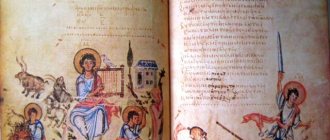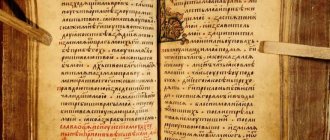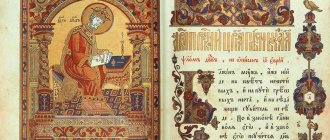Interpretation of the Psalm
The main idea of the text is that the righteous are blessed. The word “blessed” means the word happy, i.e. a person who fulfills God's commandments and walks in His ways is happy. It refers not only to earthly well-being, but also to a spiritual state of peace and happiness. The word “husband” means just a man, and the wicked here is a man who has nothing to do with the Lord and the commandments.
A more detailed analysis of the verses will give a better idea of the text:
- The first verse describes the actions of a righteous man: he in no way associates with sinners and the unrighteous. “Does not walk, ... does not stand, ... does not sit” - three types of evasion from evil, despite the internal craving for evil, a person avoids it and the slightest temptation in every possible way.
- The second verse says that the righteous, instead of being with the unrighteous, is immersed in thoughts about the highest all day long. The righteous person is characterized on the positive side; he correlates each of his actions with God’s will and His law. The will here is an attraction to the “law of the Lord,” i.e. to the Divine.
- The third verse describes the condition of a righteous person - the consequence of fulfilling God's law is the growth and well-being of a person in both the spiritual and material realms. To better understand the idea, the author compares such a person to a tree near a pond.
- Verses 4-6 compare two types of people, those who keep the Law and those who do not keep the Law. The author characterizes sinners - they are like dust, they cannot stand still, they have no weight. Here we are talking about the judgment of such people, but it is not entirely clear what kind of court - heavenly or court during life.
Important! The first canto is an excellent text to ponder. This describes a true believer, not a religious person, whose goal is strict adherence to the letter of the law, but a desire and thirst for God's word.
The psalmist David promises the faithful follower success in every endeavor, because the Lord becomes his patron
Introduction
The Book of Psalms is used more often than other books of Holy Scripture during Divine services and in personal, private prayer. The most common are the two main texts of the Psalter: Church Slavonic and Russian, included in the Synodal edition of the Bible.
The Church Slavonic text of the psalms is a translation from the Greek text of the Old Testament, which arose in the 3rd century. BC e. This Greek text is called the Septuagint, or the translation of the seventy interpreters (LXX). It was this Greek translation that formed the basis of the patristic tradition of interpretation of Holy Scripture in the first centuries of Christianity in the East and West.
The Russian, Synodal translation of the Psalter, which is part of the Holy Scriptures of the Old Testament, was made in contrast to the Church Slavonic Psalter according to the Hebrew text of the Bible, therefore, when comparing it with the liturgical Psalter, there are certain inconsistencies, and it is not able to fully clarify many difficult passages.
Understanding its meaning, and simply the literal content of the psalms, presents certain difficulties that can be overcome. The Psalter has always been a source of prayerful inspiration for all generations of Christians and thus has a long history of its reading and interpretation.
Two approaches to explaining the psalms can be outlined: an approach based on the tradition of the existence and perception of the psalms in the history of the Church, and an approach based on biblical criticism, based on the original text and the historical context of the emergence of the Psalter.
Both the Greek text of seventy interpreters and the Church Slavonic text, dating back to the works of Saints Cyril and Methodius, became an independent phenomenon of spiritual culture, and most importantly, the biblical prayer text of the Slavic peoples. And we must understand it, and not only understand, but see and feel the spiritual richness and fullness of this prayerful prophetic sighing, which inspired and rejoiced our ancestors.
The goal of biblical criticism is to reconstruct the original text and identify its true meaning, that is, the one that the author intended in his historical context. Therefore, for biblical studies, the Hebrew text from which the Psalter was translated into ancient Greek as part of the Septuagint is more important. However, the key to the church’s understanding of the Psalter lies in the tradition of its existence and reading. In the Roman Empire, Byzantium and Rus', the Psalter existed in the form of a Greek translation by seventy interpreters and a translation from it into Church Slavonic. Thus, the original Hebrew text appears rather on the periphery of the Orthodox tradition. P. A. Yungerov (1856–1921), a famous pre-revolutionary researcher and translator of the Old Testament, had a high opinion of the Slavic text of the Psalter and believed that it “is a copy of the Greek church Psalter, as it was and is now used in worship, interpreted in the ancient paternal period and in recent times."
Giving priority to the Greek text, the Greek and Slavic traditions, one should not at all diminish the importance of the Hebrew text and the achievements of modern biblical studies. The scientific approach to the Holy Scriptures and elements of biblical criticism are well known to the ancient Church (eg Origen, Lucian, St. Jerome of Stridon). Therefore, along with other sources of interpretation of the psalms, for their understanding it is necessary to turn to the tradition of studying the Hebrew text and its translation. Psalms are a poetic text, filled with images and various figures, which are characterized by parallelism, rhythm, repetition and other features characteristic of the Jewish biblical tradition.
Being simultaneously a biblical and liturgical book, the Word of God and a prayer book, the Psalter, both as an object of interpretation and from the point of view of the form of the text, is an integral and separate work that existed independently. The historical path of the Greek Psalter in the LXX translation is unusually complex due to the many reconciliations, editions, reviews, etc., and in fact it is difficult to say for sure from which exact text the Church Slavonic translation was made at one time, which in turn was also subject to changes. Thus, the scientific, critical edition of the Septuagint will not reflect all forms of expression of the rich and living text of the Psalter, in the perception of which not only various methods of biblical exegesis can be applied, but the prayer experience of the Church must also be taken into account.
The text of the Psalter used during worship, that is, the Church Slavonic text for a Christian in Slavic countries is the text of a living church tradition. Therefore, it is this, more than the original Hebrew text, that can be considered as the first object of explanation. The richness and completeness of meaning and form, no less than in the study of the Hebrew original, is revealed when perceiving the text of living church tradition, because, just as the prophet once composed the psalms, responding to the Word of God speaking to him, so in the Church, responding to the Divine Logos, that same Revelation. It is the existence of the text in the Tradition of the Church that gives us the true richness of the content and meaning of the psalms.
This explanation is a consideration of the Psalter in the context of various forms of Sacred Tradition, so that the texts so often heard and read become an expected and joyful event in church and personal prayer. The purpose of this commentary will be an attempt to awaken love and interest in the Book of Psalms, to draw attention to the richness of its content.
The explanation will not be a line-by-line commentary on each verse, but will concern both the general nature of each psalm, its meaning and meaning, the biblical-historical context, and its individual verses, either causing special difficulties in understanding, or having special significance.
To understand the psalms, it is necessary, firstly, to consider the lexical meaning of words with the help of dictionaries, various translations, etc., and secondly, to understand the meaning of the content with the help of interpretations. Now, when comprehending the psalms, we turn to the tradition of understanding them at different times and, collecting different approaches to their explanation, we have a wide palette of meanings for ourselves. The Psalter, perceived through the experience of reading it by ancient church authors and Christian thinkers, becomes an amazing expression of deep intuitions and the most important truths of faith.
Sources for explaining the psalms can be their translations, ancient classical interpretations, patristic works, liturgical use and, in general, any Christian context for their citation and reference.
Of course, an important aid in explaining the text is its translation. Currently, there are two main translations of the Psalter into Russian. Synodal translation of the 19th century. from the Hebrew text and translation by P. A. Yungerov from the Greek text of the Septuagint. Naturally, the second translation is more consistent with the Church Slavonic Psalter and was undertaken at one time precisely for its better understanding. In addition, P. A. Yungerov’s translation also became a study of the Psalter: his brief notes on individual verses of the psalms are especially valuable, opening up prospects for further research to explain difficult passages. We can also mention the translation from Church Slavonic made by E. N. Birukova and I. N. Birukov1.
There are many known texts devoted to the explanation of the Psalter, which arose in the golden age of patristic writing in the 4th-5th centuries. Here are the most famous and significant of them.
1. Interpretation of the Psalms attributed to St. Athanasius of Alexandria. Due to insertions by later authors, modern scholars deny this work authenticity. However, in this explanation, one can undoubtedly hear the voice and read the opinion of the ancient Church in the interpretation of the Psalter. Moreover, this is the Alexandrian tradition with its allegorical approach and Christocentric understanding of the psalms. This is a patristic text that was preserved by the ancient Church and brought to us by the Orthodox tradition, inscribing it with the name of one, perhaps the most significant of the authors who composed it.
2. The most significant and famous interpretation of the Psalter in the Orthodox East was the interpretation of Blessed Theodoret of Cyrus, which combined Antiochene scholarship and the established tradition of church understanding of the psalms. According to P. A. Yungerov, his “explanation is brief, moral and typological.” Blzh. Theodoret pays attention to language, images, historical facts, and translations available in his time.
3. Conversations on the psalms of St. Basil the Great does not cover the entire Psalter: conversations on Ps. 1, 7, 14, 28, 29, 32, 33, 44, 45 and 48.
4. Due to the lack of a Russian translation, the typological explanation of the psalms of St. is also less known. Cyril of Alexandria, which is also incompletely preserved.
5. Conversations on the psalms of St. John Chrysostom reflect the “scientific” approach to the interpretation of Scripture characteristic of the Antiochians. Although the works of this saint are primarily of a moral nature, the basis for preaching in them is a scientific approach, an understanding of the literal meaning and elements of biblical criticism in the form of the use and comparison of existing translations of the Bible into Greek. The conversations on 58 psalms (4–12, 43–49, 108–117, 119–150) are considered authentic.
Also, such valuable authentic works of the holy fathers as the “Epistle to Marcellinus on the Interpretation of the Psalms” by St. are devoted to the interpretation of the psalms. Athanasius of Alexandria and “On the Inscription of Psalms” by St. Gregory of Nyssa.
Many texts by other church writers have been preserved, famous in their time, but later subjected to criticism due to non-Orthodox views. Such authors include Origen, Didymus the Blind, Apollinaris of Laodicea, Diodorus of Tarsus, Theodore of Mopsuestia, Evagrius of Pontus, Asterius the Sophist. However, their works undoubtedly had an influence on Orthodox exegesis, so their legacy has its value both in method and in content. For the most part, these are texts that have not been translated into Russian, but are available, however, in the Greek original.
Western authors have interpretations of all 150 psalms of the blessed one. Augustine. From other authors, what has come down to us for the most part is either conversations on some psalms, or fragments and explanations of individual psalms. It is important to mention Hilarius of Pictavia, St. Ambrose of Milan, blessed. Hieronymus of Stridon, Cassiodorus.
The interpretation of Euthymius Zigaben, well known in the Orthodox tradition, dates back to the later Byzantine period and represents a reworking of previous patristic explanations, supplemented by its own interpretation.
How the ancient church authors read and understood the psalter remains a mystery to us in many ways. Often the explanations have the character of a sermon and have a moralizing sound. Also, sometimes authors develop their own thoughts, dear or relevant for their time, simply starting from the sacred text, for example, considering the psalms as steps of spiritual ascent (St. Gregory of Nyssa). Like the entire Old Testament as a whole, so, in particular, the Book of Psalms, already on the pages of the New Testament, is presented as a primarily messianic book, prophesying about Christ the Savior.







